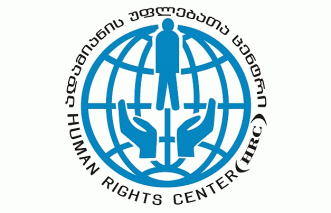Statement by Human Rights Center on the disproportionate dispersal of peaceful protest in Zhoneti by police force
November 16, 2020

On November 14, in village Zhoneti of Tskaltubo Municipality, a peaceful protest was held by the local population of the villages of the Rioni river valley against the construction of Namakhvani Hydroelectric Power Plant (HPP) cascade. Namakhvani HPP Cascade, the largest energy project in Georgia, envisages the construction of a 433 MW two-stage hydropower cascade in the Rioni river basin, the negative impact of which, according to the organisation Green Alternative, will affect many villages in Tsageri and Tskaltubo municipalities. 104 families with 269 inhabitants may be subject to physical and economic resettlement in the Namakhvani HPP project impact zone, while 47 families alone may be subject to economic resettlement.
Locals and activists in the Namakhvani HPP cascade construction site have been protesting for 21 days in various forms of peaceful protest-, including overnight stay in tents at the construction site. The protesters demanded the construction company to leave the territory and to withdraw the construction equipment. The actions of the protesters were entirely peaceful.
On the afternoon of November 14, protesters blocked the road connecting the town of Kutaisi and Lechkhumi region for several hours. The demonstration was dispersed by law enforcers using physical force – pushing protesters away physically. Due to the fact that some of the protesters were chained to each other, many of them fell down during the dispersal of the rally and were injured when police was removing them from the rally site, as proved by the video footage depicting the dispersal.
According to international human rights standards, there was no grounds for the dispersal of the peaceful rally held on November 14 in village Zhoneti. When restricting a peaceful assembly, the balance must be maintained between the public and private interests. The issue of which interest outweighs in the particular case should be decided by the individual circumstances of the case and not by a blanket prohibition. It is a blanket prohibition when the state is empowered to disperse any protest action anywhere under the sole reason of road blockage by the protesters, without assessing individual circumstances, without looking into the opposing public and private interests and judging as to which interest is preferable in a particular case.. The dispersal of a peaceful rally by the state on November 14 in the village of Zhoneti was a classic example of a blanket application of restrictions on peaceful assembly. Such a restriction on the right of assembly is disproportionate, making the use of police force against the protesters illegitimate.
According to international human rights standards, when assessing the proportionality of the dispersal of a rally due to the road blockage, attention should be paid to whether the protesters had other opportunities to express their protest in public space. In this case, the rally was held in the village of Zhoneti, Tskaltubo district, by the local population, together with the local residents of neighboring villages. The public spaces where this group of people would be able to express their protest on the critical social issues, so that the protest would actually reach the wider public and be perceived by it, are scarce. In the village of Zhoneti and neighboring villages, apart from the road going through the village, there is virtually no public space where the protest rally of the local population would attract the attention of the general public. The essence of the right to peaceful assembly is to convey the message of protest to the general public, not just the public on the local level.
It is also important to note that the protesters had blocked the road for only a few hours and their actions did not go beyond the protected scope of right to peaceful assembly. The state dispersed the peaceful protesters without any warning or attempt to negotiate. The purpose of dispersing the rally was to restore vehicular traffic on the road connecting the city of Kutaisi and Lechkhumi region. This road is not busy transport zone. From the video footage and other information disseminated by the mass media, there is no evidence showing the need of rapid resumption of traffic on the road.
Considering that the locals in the village of Zhoneti and neighboring villages had no other real opportunity to protest in public space at the local level, blocking the road for several hours belonged to the protected scope of their right to peaceful assembly.
Consequently, in this case, the interest of holding the protest in this form outweighs the interest of dispersing the protest rapidly. Thus, the dispersal of a peaceful protest by the state in village Zhoneti on 14 November constituted a disproportionate restriction on the right to peaceful assembly.
News
December 13, 2023
Ethnic minorities outside the peace dialogue
November 6, 2023
‘Peace’ agenda of political parties
Popular
Articles
February 13, 2024



